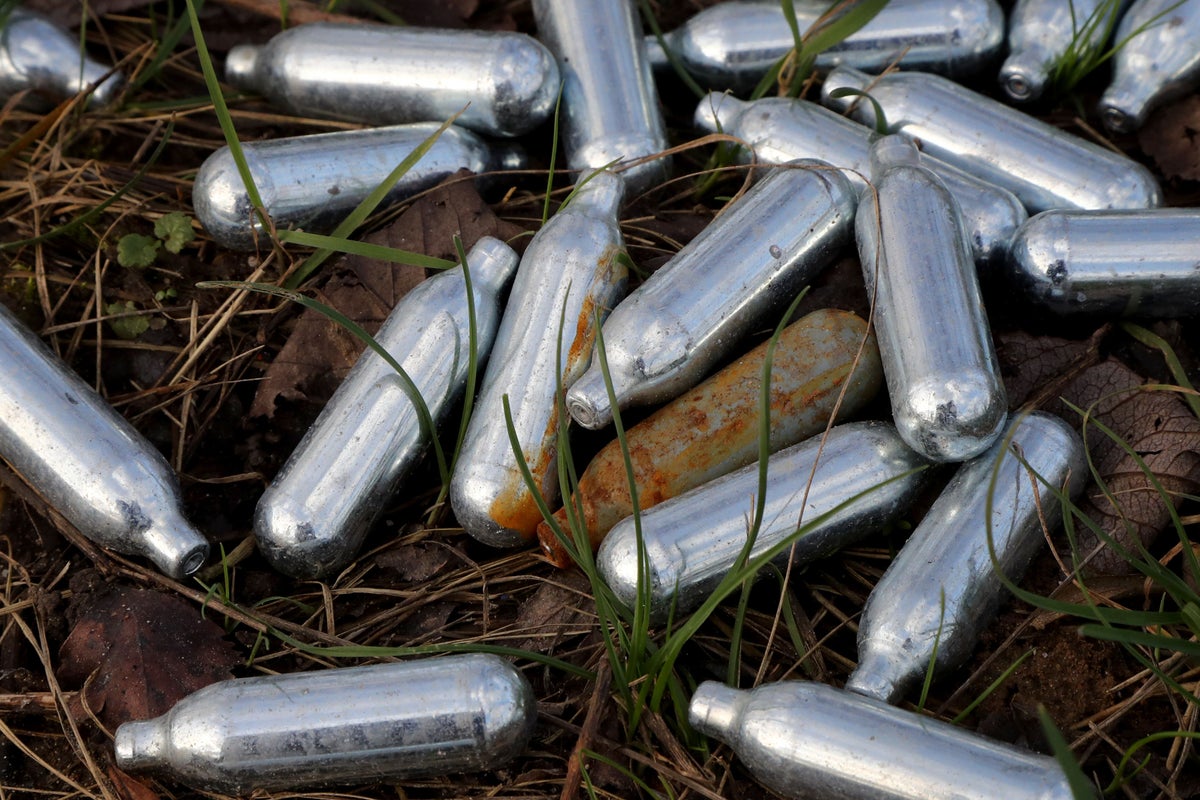
A ban on nitrous oxide, otherwise known as laughing gas, is a step closer to becoming law as concerns were raised about a potential shift towards glue sniffing in parks and playgrounds.
MPs voted 404 to 36, majority 368, in favour of a motion to make nitrous oxide a Class C substance under the Misuse of Drugs Act 1971.
Dealers and users could face jail time and unlimited fines under the measures which are expected to come into force by the end of the year, according to the Home Office.
But the debate saw several MPs raising concerns about the ban, including Tory former Cabinet minister Kit Malthouse who argued that an unintended consequence could be “the resumption of glue sniffing in parks and playgrounds”.
Tory former health minister Dr Dan Poulter said the Government would achieve “very little through these measures” and that there was actually limited data that would suggest nitrous oxide was substantially more harmful than caffeine.
Mr Malthouse, who served as policing minister under former prime minister Boris Johnson, said: “One of the characteristics of my youth in Liverpool in the 1970s and ’80s was groups of young people gathering together to sniff glue.
“It was a horrible thing to do and obviously had serious impact on their brains, the chemicals are even more noxious than this particular substance, and so how will he ensure that there isn’t a diversion if you like, towards those kinds of substances and the resumption of glue sniffing in parks and playgrounds, instead of taking this gas?”
We cannot arrest our way out of a public health issue. It doesn't tackle the reasons why people are taking these in the first place. It doesn't tackle supply and it doesn't tackle public health— SNP home affairs spokeswoman Alison Thewliss
Dr Poulter, who said he would vote against the motion, told MPs: “I have dealt with misuse of drugs quite extensively throughout my medical career.
“What I would say is that I believe in an evidence-based approach to policy-making and I believe that we have had this issue examined at the request of the Government by the ACMD (Advisory Council on the Misuse of Drugs) and the ACMD very clearly suggested that this was not the appropriate legislative vehicle to deal with nitrous oxide.”
Dr Poulter added: “There’s relatively limited evidence and data actually that actually would suggest that nitrous oxide is substantially more harmful than many substances that we use daily like caffeine, for example.
“If you use caffeine to great excess, that has very profound immediate health consequences, and indeed alcohol.”
Meanwhile, SNP home affairs spokeswoman Alison Thewliss said: “We cannot arrest our way out of a public health issue. It doesn’t tackle the reasons why people are taking these in the first place. It doesn’t tackle supply and it doesn’t tackle public health.”
She added: “We on the SNP benches, we oppose this SI (statutory instrument) and are voting against it tonight. It criminalises people at unclear cost, there is no sense of tackling the source or reducing demand or treating this as a public health issue. And it is bang on form, if I may say so, that the Labour Party are going on along with this unevidenced drivel this evening. In Scotland, we want to see a humane drug policy.”
Home Office minister Chris Philp confirmed further secondary legislation would be tabled in a bid to outline the exemptions to ensure those working in sectors such as catering and research were not affected by the changes.
He said the exemption would seek to ensure the Government did not “unintentionally stymie either medical research or commercial use for this drug”.
(Nitrous oxide) was the third most misused substance among (young people) and, as we've discussed already, there is evidence it has harmful neurological effects particularly when consumed in quite large quantities— Home Office minister Chris Philp
Outlining the Government’s reasoning for the ban, Mr Philp said: “230,000 young people inhaled this harmful substance in the year ending June 2022.
“It was the third most misused substance among that age group and, as we’ve discussed already, there is evidence it has harmful neurological effects particularly when consumed in quite large quantities.”
Mr Philp was heckled by MPs as he sought to downplay the impact of beer.
After the minister said an estimated 13 tonnes of laughing gas canisters were collected from Notting Hill Carnival by the clean-up crews, Labour MP Lloyd Russell-Moyle (Brighton Kemptown) asked: “How many tonnes of beer cans were collected?”
Mr Philp replied: “The consumption of beer does not, generally speaking, lead to severe neurological damage and paralysis in a way that the consumption of large amounts of nitrous oxide does.”
The secondary legislation will undergo further scrutiny in the House of Lords at a later stage.





